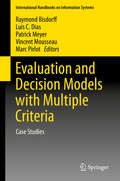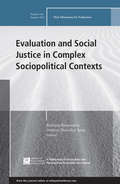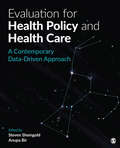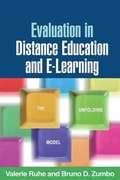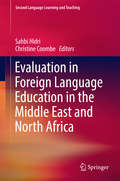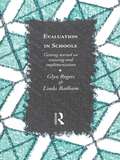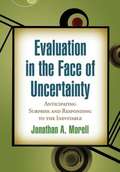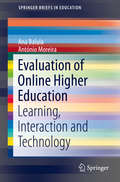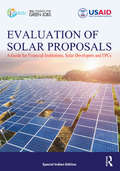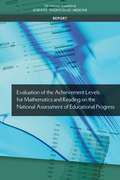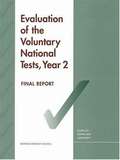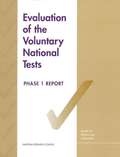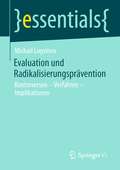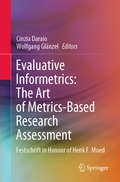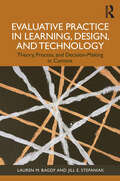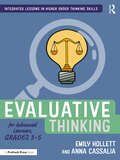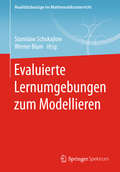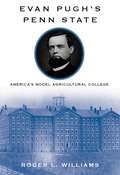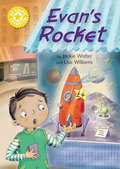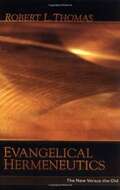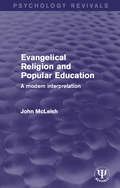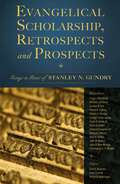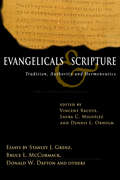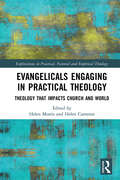- Table View
- List View
Evaluation and Decision Models with Multiple Criteria
by Marc Pirlot Raymond Bisdorff Luis C. Dias Patrick Meyer Vincent MousseauThis book showcases a large variety of multiple criteria decision applications (MCDAs), presenting them in a coherent framework provided by the methodology chapters and the comments accompanying each case study. The chapters describing MCDAs invite the reader to experiment with MCDA methods and perhaps develop new variants using data from these case studies or other cases they encounter, equipping them with a broader perception of real-world problems and how to overcome them with the help of MCDAs.
Evaluation and Social Justice in Complex Sociopolitical Contexts: New Directions for Evaluation, Number 146 (J-B PE Single Issue (Program) Evaluation)
by Barbara Rosenstein Helena Desivilya SynaThis volume is devoted to the theme of social responsibility, social justice, and evaluation. It examines the evaluation–social justice interface and: shares a variety of options and examples from different settings, gives voice to populations whose voices are rarely heard, and contributes to fulfilling the potential of the significant role evaluation can have in promoting social change. First discussing issues related to evaluation, social responsibility, social justice, and marginalized populations in general, it goes on to address issues concerning populations marginalized due to health, psychological, and physical difficulties; their cultural or ethnic/national status; or the specific geopolitical context of Israel. This is the 146th issue in the New Directions for Evaluation series from Jossey-Bass. It is an official publication of the American Evaluation Association.
Evaluation for Health Policy and Health Care: A Contemporary Data-Driven Approach
by Anupa Bir Steven SheingoldThis is the contemporary, applied text on evaluation that your students need. Evaluation for Health Policy and Health Care: A Contemporary Data-Driven Approach explores the best practices and applications for producing, synthesizing, visualizing, using, and disseminating health care evaluation research and reports. This graduate-level text will appeal to those interested in cutting-edge health program and health policy evaluation in this era of health care innovation. Editors Steven Sheingold and Anupa Bir’s core text focuses on quantitative, qualitative, and meta-analytic approaches to analysis, providing a guide for both those executing evaluations and those using the data to make policy decisions. It is designed to provide real-world applications within health policy to make learning more accessible and relevant, and to highlight the remaining challenges for using evidence to develop policy.
Evaluation for Health Policy and Health Care: A Contemporary Data-Driven Approach
by Anupa Bir Steven SheingoldThis is the contemporary, applied text on evaluation that your students need. Evaluation for Health Policy and Health Care: A Contemporary Data-Driven Approach explores the best practices and applications for producing, synthesizing, visualizing, using, and disseminating health care evaluation research and reports. This graduate-level text will appeal to those interested in cutting-edge health program and health policy evaluation in this era of health care innovation. Editors Steven Sheingold and Anupa Bir’s core text focuses on quantitative, qualitative, and meta-analytic approaches to analysis, providing a guide for both those executing evaluations and those using the data to make policy decisions. It is designed to provide real-world applications within health policy to make learning more accessible and relevant, and to highlight the remaining challenges for using evidence to develop policy.
Evaluation in Distance Education and E-Learning
by Valerie Ruhe Bruno ZumboWith the rapid proliferation of distance education and e-learning courses, the need is growing for a comprehensive, professional approach to evaluating their effectiveness. This indispensable book offers a road map to guide evaluation practice in these innovative learning environments. Providing practical, step-by-step guidelines and tools for conducting evaluation studies including how to deal with stakeholders, develop surveys and interview protocols, collect other scientific evidence, and analyze and blend mixed-methods data the work also features a template for writing high-quality reports. The "unfolding model" developed by the authors draws on Messick's influential assessment framework and applies it to program evaluation. Two case studies of actual programs (a distance learning course and an e-learning course) demonstrate the unfolding model in action.
Evaluation in Foreign Language Education in the Middle East and North Africa
by Christine Coombe Sahbi HidriThis book presents evaluation cases from the Middle East and North Africa (MENA) context, investigating the various facets of evaluation in different parts of the MENA region and beyond. In 19 chapters, it explores cases from Tunisia, Saudi Arabia, Egypt, Sudan, Syria, the UAE, Turkey, Iran and Morocco. The book highlights the impact of evaluation on a range of stakeholders, arguing that it has repercussions at the individual, societal, economic, cultural and political levels, that it also has an ethical dimension, and that it is tailored to people's needs, helping them to remain abreast of the effectiveness and efficiency of programs. Further, the book explores controversial issues concerning different evaluation themes, such as teacher and staff evaluation, assessment practices, text genre analysis evaluation, assessment of productive skills, textbook and ICT evaluation, evaluation of ELT certificates and programs, quality assurance, ESP needs analysis, assessment literacy, and dynamic assessment. It addresses key challenges, such as who the "right people" to implement evaluation are, and the appropriate use of evaluation results to avoid any misuse or harm to any stakeholder. In closing, the book calls for further research venues on the relevance of evaluation, testing and assessment in the MENA context and beyond.
Evaluation in Schools: Getting Started with Training and Implementation
by Glyn Rogers Linda BadhamFirst published in 1992. Routledge is an imprint of Taylor & Francis, an informa company.
Evaluation in the Face of Uncertainty
by Jonathan MorellUnexpected events during an evaluation all too often send evaluators into crisis mode. This insightful book provides a systematic framework for diagnosing, anticipating, accommodating, and reining in costs of evaluation surprises. The result is evaluation that is better from a methodological point of view, and more responsive to stakeholders. Jonathan A. Morell identifies the types of surprises that arise at different stages of a program's life cycle and that may affect different aspects of the evaluation, from stakeholder relationships to data quality, methodology, funding, deadlines, information use, and program outcomes. His analysis draws on 18 concise cases from well-known researchers in a variety of evaluation settings. Morell offers guidelines for responding effectively to surprises and for determining the risks and benefits of potential solutions.
Evaluation of Online Higher Education
by António Moreira Ana BalulaThe work presents a theoretical framework for the evaluation of e-Teaching that aims at positioning the online activities designed and developed by the teacher as to the Learning, Interaction and Technology Dimensions. The theoretical research that underlies the study was developed reflecting current thinking on the promotion of quality of teaching and of the integration of information and communication tools into the curriculum in Higher Education (HE), i. e. , bearing in mind some European guidelines and policies on this subject. This way, an answer was sought to be given to one of the aims put forward in this study, namely to contribute towards the development of a conceptual framework to support research on evaluation of e-teaching in the context of HE. Based on the theoretical research carried out, an evaluation tool (SCAI) was designed, which integrates the two questionnaires developed to collect the teachers' and the students' perceptions regarding the development of e-activities. Consequently, an empirical study was structured and carried out, allowing SCAI tool to be tested and validated in real cases. From the comparison of the theoretical framework established and the analysis of the data obtained, we found that the differences in teaching should be valued and seen as assets by HE institutions rather than annihilated in a globalizing perspective.
Evaluation of Solar Proposals: A Guide for Financial Institutions, Solar Developers and EPCs
by Bishnoi Tanmay; Khanna Ronnie; Karandikar Arvind; Bishnoi DeepankerThis handbook deals with the subject of how an individual can review and evaluate a detailed project report of a Solar PV power plant, which includes feasibility study of the site for installation, assessing of the techno - commercial feasibility, determining the financial viability of setting up a Solar PV Power Plant.
Evaluation of the Achievement Levels for Mathematics and Reading on the National Assessment of Educational Progress
by Engineering Medicine National Academies of SciencesSince 1969, the National Assessment of Educational Progress (NAEP) has been providing policymakers, educators, and the public with reports on academic performance and progress of the nation’s students. The assessment is given periodically in a variety of subjects: mathematics, reading, writing, science, the arts, civics, economics, geography, U.S. history, and technology and engineering literacy. NAEP is given to representative samples of students across the U.S. to assess the educational progress of the nation as a whole. Since 1992, NAEP results have been reported in relation to three achievement levels: basic, proficient, and advanced. However, the use of achievement levels has provoked controversy and disagreement, and evaluators have identified numerous concerns. This publication evaluates the NAEP student achievement levels in reading and mathematics in grades 4, 8, and 12 to determine whether the achievement levels are reasonable, reliable, valid, and informative to the public, and recommends ways that the setting and use of achievement levels can be improved.
Evaluation of the Voluntary National Tests, Year 2: Final Report
by Committee on the Evaluation of the Voluntary National Tests Year 2The National Academies Press (NAP)--publisher for the National Academies--publishes more than 200 books a year offering the most authoritative views, definitive information, and groundbreaking recommendations on a wide range of topics in science, engineering, and health. Our books are unique in that they are authored by the nation's leading experts in every scientific field.
Evaluation of the Voluntary National Tests: Phase 1
by Lauress L. WiseThe National Academies Press (NAP)--publisher for the National Academies--publishes more than 200 books a year offering the most authoritative views, definitive information, and groundbreaking recommendations on a wide range of topics in science, engineering, and health. Our books are unique in that they are authored by the nation's leading experts in every scientific field.
Evaluation und Radikalisierungsprävention: Kontroversen – Verfahren – Implikationen (essentials)
by Michail LogvinovDieses essential befasst sich mit Paradigmen und Verfahren der Evaluation und schlägt einen Bogen zu aktuellen Kontroversen rund um das Thema „Evaluationsansätze in der Radikalisierungsprävention“. Michail Logvinov zeichnet Defizite der Evidenzschaffung nach und formuliert Vorschläge für die Wissenschaft und Praxis. Darüber hinaus plädiert er für eine Intensivierung des Wissenstransfers zwischen der Evaluationsforschung und Fachpraxis mit dem Ziel, gegenstandsadäquate wirkungsorientierte Evaluationsdesigns zu entwickeln und zu testen.
Evaluative Informetrics: Festschrift in Honour of Henk F. Moed
by Wolfgang Glänzel Cinzia DaraioWe intend to edit a Festschrift for Henk Moed combining a “best of” collection of his papers and new contributions (original research papers) by authors having worked and collaborated with him. The outcome of this original combination aims to provide an overview of the advancement of the field in the intersection of bibliometrics, informetrics, science studies and research assessment.
Evaluative Practice in Learning, Design, and Technology: Theory, Process, and Decision-Making in Context
by Jill E. Stefaniak Lauren M. BagdyEvaluative Practice in Learning, Design, and Technology provides learning, design, and technology stakeholders with comprehensive resources intended to support their engagement in evaluative activities. Evaluation—the process that determines whether performance results have been achieved and meet expectations within an organization—is an important step in the instructional design process. However, the field’s current literature is largely missing coverage of influential contextual factors and evidence-based techniques. This book presents a thorough overview of the theoretical foundations that influence evaluation practices, identifies and distinguishes between numerous evaluative methods, and emphasizes the decision-making skills required of those leading and implementing evaluation. Graduate students and professionals will be better prepared to meet the expectation of competency in formative, summative, and program evaluations.
Evaluative Thinking for Advanced Learners, Grades 3–5 (Integrated Lessons in Higher Order Thinking Skills)
by Emily Hollett Anna CassaliaEvaluative Thinking for Advanced Learners, Grades 3-5 will teach students to think critically about values, issues, and ideas while creating defensible arguments. Evaluative thinking is a skill which helps students learn to weigh values and facts in making judgements. Working through the lessons and handouts in this book, students will examine difficult and ambiguous questions from a subjective and balanced perspective. This curriculum provides cohesive, focused, scaffolded lessons to teach each targeted area of competency, followed by authentic application activities for students to then apply their newly developed skill set. This book can be used as a stand-alone gifted curriculum or as part of an integrated curriculum. Each lesson ties in both reading and metacognitive skills, making it easy for teachers to incorporate into a variety of contexts.
Evaluierte Lernumgebungen zum Modellieren (Realitätsbezüge Im Mathematikunterricht Ser.)
by Werner Blum Stanislaw SchukajlowDas Buch stellt empirisch gesicherte Erkenntnisse über Lernumgebungen im Bereich Modellieren vor. Dabei wird den Bestrebungen nach mehr Wissenschaftlichkeit einerseits und einer hinreichend ausführlichen Beschreibung der untersuchten Lernumgebungen andererseits Rechnung getragen. Die vorgestellten Ansätze zur Förderung der Modellierungskompetenz sind in die aktuelle Modellierungsdiskussion eingebunden und wurden mit qualitativen oder quantitativen Methoden evaluiert. Der Hauptfokus wird in diesem Band aber auf die Lernumgebungen und zugehörige Unterrichtsmaterialien gelegt. Die Lernumgebungen wurden alle in der Praxis erprobt und stellen in diesem Sinne „Best-Practice“-Beispiele dar, die Anregungen und Ermutigungen für praktizierende und künftige Lehrer und Hochschullehrer geben sollen.
Evan Pugh’s Penn State: America’s Model Agricultural College
by Roger L. WilliamsWhen Evan Pugh became the first president of Pennsylvania’s Farmers’ High School—later to be known as The Pennsylvania State University—the small campus was in disrepair and in dire need of leadership. Pugh was young, barely into his 30s, but he was energetic, educated, and visionary. During his tenure as president he molded the school into a model institution of its kind: America’s first scientifically based agricultural college.In this volume, Roger Williams gives Pugh his first book-length biographical treatment. Williams recounts Pugh’s short life and impressive career, from his early days studying science in the United States and Europe to his fellowship in the London Chemical Society, during which he laid the foundations of the modern ammonium nitrate fertilizer industry, and back to Pennsylvania, where he set about developing “upon the soil of Pennsylvania the best agricultural college in the world” and worked to build an American academic system mirroring Germany’s state-sponsored agricultural colleges. This last goal came to fruition with the passage of the Morrill Act in 1862, just two years prior to Pugh’s death. Drawing on the scientist-academic administrator’s own writings and taking a wide focus on the history of higher education during his lifetime, Evan Pugh’s Penn State tells the compelling story of Pugh’s advocacy and success on behalf of both Penn State and land-grant colleges nationwide.Despite his short life and career, Evan Pugh’s vision for Penn State made him a leader in higher education. This engaging biography restores Pugh to his rightful place in the history of scientific agriculture and education in the United States.
Evan's Rocket: Independent Reading Yellow 3 (Reading Champion #445)
by Jackie WalterEvan really wants to buy the rocket he sees in the shop window, but he needs to save up for it first!This story is part of Reading Champion, a series carefully linked to book bands to encourage independent reading skills, developed with Dr Sue Bodman and Glen Franklin of UCL Institute of Education (IOE).Reading Champion offers independent reading books for children to practise and reinforce their developing reading skills.Fantastic, original stories are accompanied by engaging artwork and a reading activity. Each book has been carefully graded so that it can be matched to a child's reading ability, encouraging reading for pleasure.
Evangelical Hermeneutics: The New Versus The Old
by Robert L. ThomasHermeneutical theory has been extensively expanded, refined, and rethought over the last three decades—leading to both confusion and conflict over how contemporary evangelicals should read, interpret, and apply Scripture. Dr. Thomas compares, contrasts, and clarifies the basic characteristics of and developing conflicts between traditional evangelical hermeneutics and newer theories that place one's "preunderstanding" at the beginning of the interpretive process. This accomplished and acclaimed scholar evaluates how some newer methods may open the door to unorthodox—and potentially spurious—interpretations of Scripture's core teachings.
Evangelical Religion and Popular Education: A Modern Interpretation (Psychology Revivals)
by John McLeishUnder the influence of the evangelical movement in the 18th and early 19th centuries education, in one form or another, was brought to a vast number of people in England and Wales. Originally published in 1969, it is this phenomenon that forms the subject of Dr McLeish’s book. The two central figures are Griffith Jones and Hannah More and the movements are seen almost entirely through their work. Dr McLeish examines the nature and aims of the schools which were established; their economics and organisation; their progress and achievement; the social background in which they flourished. In the second part of his book Dr McLeish attempts a bold synthesis. He analyses these data in light of four essentially modern social theories – Marxist dialectics, the functionalist anthropology of Malinowski, Freudian psychoanalysis, and the sociology of Talcott Parsons. The author does not pretend to provide all the answers. What he suggests is a way of looking at history that is open-minded and eclectic and vitalizing in the perspectives which it offers.
Evangelical Scholarship, Retrospects and Prospects: Essays in Honor of Stanley N. Gundry
by Verlyn VerbruggeThis is, perhaps, the most multifaceted collection of essays Zondervan has ever published. A fitting Festschrift to Stan Gundry, a man known by many people for many things, but never for being one-dimensional. As a pastor, scholar, publisher, mentor, and trusted friend, Stan has played diverse roles and worn numerous hats in his professional tenure.Contributors from a variety of disciplines put a Gundry spin on a topic of their expertise and choosing--whether it's an evangelical-historical look at recent developments in their particular discipline or reflections on a topic at the center of Stan's interests. The result is this Festschrift--as multilayered, engaging, and authentic as the man it honors.Contributors and essays include the following:Craig L. Blomberg - "Does the Quest for the Historical Jesus Still Hold Any Promise?"Millard J. Erickson - "Eighty Years of American Evangelical Theology"Gordon D. Fee - "On Women Remaining Silent in the Churches: A Text-Critical Approach to 1 Corinthians 14:34-35"Robert A. Fryling - "A Key to a Publishing Friendship"Robert H. Gundry - "A Brotherly Tribute"Carolyn Custis James and Frank A. James III - "The Blessed Alliance: Already But Not Yet"Karen H. Jobes - "'It Is Written': The Septuagint and Evangelical Doctrine of Scripture"Tremper Longman III - "'What Was Said in All the Scriptures concerning Himself' (Luke 24:27): Reading the Old Testament as a Christian"Richard J. Mouw - "Faithfulness in a 'Counterpoint' World: The Role of Theological Education"Ruth A. Tucker - "Eve, Jezebel, and the Woman at the Well: Biblical Women Hijacked in the Fight against Equality"John H. Walton - "The Tower of Babel and the Covenant: Rhetorical Strategy in Genesis Based on Theological and Comparative Analysis"John D. Woodbridge - "The Fundamentalist-Modernist Controversy"Christopher J. H. Wright - "The Missional Nature and the Role of Theological Education"
Evangelicals & Scripture: Tradition, Authority and Hermeneutics (Wheaton Theology Conference Series)
by Vincent BacoteBy definition, a high view of Scripture inheres in evangelicalism. However, there does not seem to be a uniform way to articulate an evangelical doctrine of Scripture. Taking up the challenge, Vincent Bacote, Laura Miguélez and Dennis Okholm present twelve essays that explore in depth the meaning of an evangelical doctrine of Scripture that takes seriously both the human and divine dimensions of the Bible. Selected from the presentations made at the 2001 Wheaton Theology Conference, the essays approach this vital subject from three directions. Stanley J. Grenz, Thomas Buchan, Bruce L. McCormack and Donald W. Dayton consider the history of evangelical thinking on the nature of Scripture. John J. Brogan, Kent Sparks, J. Daniel Hays and Richard L. Schultz address the nature of biblical authority. Bruce Ellis Benson, John R. Franke, Daniel J. Treier and David Alan Williams explore the challenge of hermeneutics, especially as it relates to interpreting Scripture in a postmodern context. Together these essays provide a window into current evangelical scholarship on the doctrine of Scripture and also advance the dialogue about how best to construe our faith in the Word of God, living and written, that informs not only the belief but also the practice of the church.
Evangelicals Engaging in Practical Theology: Theology that Impacts Church and World (Explorations in Practical, Pastoral and Empirical Theology)
by Helen MorrisThis book aims to introduce a distinctively evangelical voice to the discipline of practical theology. Evangelicals have sometimes seen practical theology as primarily a ‘liberal’ project. This collection, however, actively engages with practical theology from an evangelical perspective, both through discussion of the substantive issues and by providing examples of practical theology done by evangelicals in the classroom, the church, and beyond. This volume brings together established and emerging voices to debate the growing role which practical theology is playing in evangelical and Pentecostal circles. Chapters begin by addressing methodological concerns, before moving into areas of practice. Additionally, there are four short papers from students who make use of practical theology to reflect upon their own practice. Issues of authority and normativity are tackled head on in a way that will inform the debate both within and beyond evangelicalism. This book will, therefore, be of keen interest to scholars of practical, evangelical, and Pentecostal theology.
